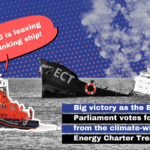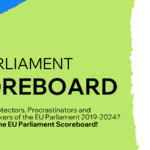The G7 Energy Ministers will meet on 9-10 April in Rome. On the agenda, the decarbonization of our economy, including the phase out of fossil fuels and related subsidies will be discussed.
The G7 must urgently see the writing on the wall and stop pouring tax payers’ money into fossil fuels, which is an economic dead-end and environmentally disastrous.
Ahead of the meeting, Markus Trilling, policy coordinator on finance and subsidies at CAN Europe said:
“To align with the Paris Agreement and following up on their previous commitments (1), G7 energy ministers should agree on a comprehensive fossil fuel subsidies phase out by 2020.
Fossil fuel subsidies hinder investments in renewable energy and energy efficiency. They also impose large fiscal costs on governments and drain scarce financial resources away from key sectors such as education and health care.
Last but not least, these subsidies negatively impact local environments and water sources and cause illness and premature deaths due to local air pollution and heightened congestion.”
Despite the overwhelming evidence against fossil fuel subsidies, governments around the world continue to pump approximately 520 billion euros per year into polluting fuels such as coal, oil, gas and diesel (2).
Without cutting off financial support for one of the causes of climate change – fossil fuels – it will be extremely difficult to effectively overcome the climate crisis.
ENDS
Contacts:
Markus Trilling, CAN Europe policy coordinator on finance and subsidies, markus@caneurope.org, +32 2894 4688
Nicolas Derobert, CAN Europe communications coordinator, nicolas@caneurope.org, +32 2894 4673
Notes:
(1) The pledge first entered into G7 (then known as G8) declarations in 2009 but has until now lacked a firm timeline compatible with the Paris agreement. (The Guardian, 26 May 2016)
(2) ECFIN, Economic Brief, Issue 40, March 2015, “Measuring fossil fuel subsidies”



